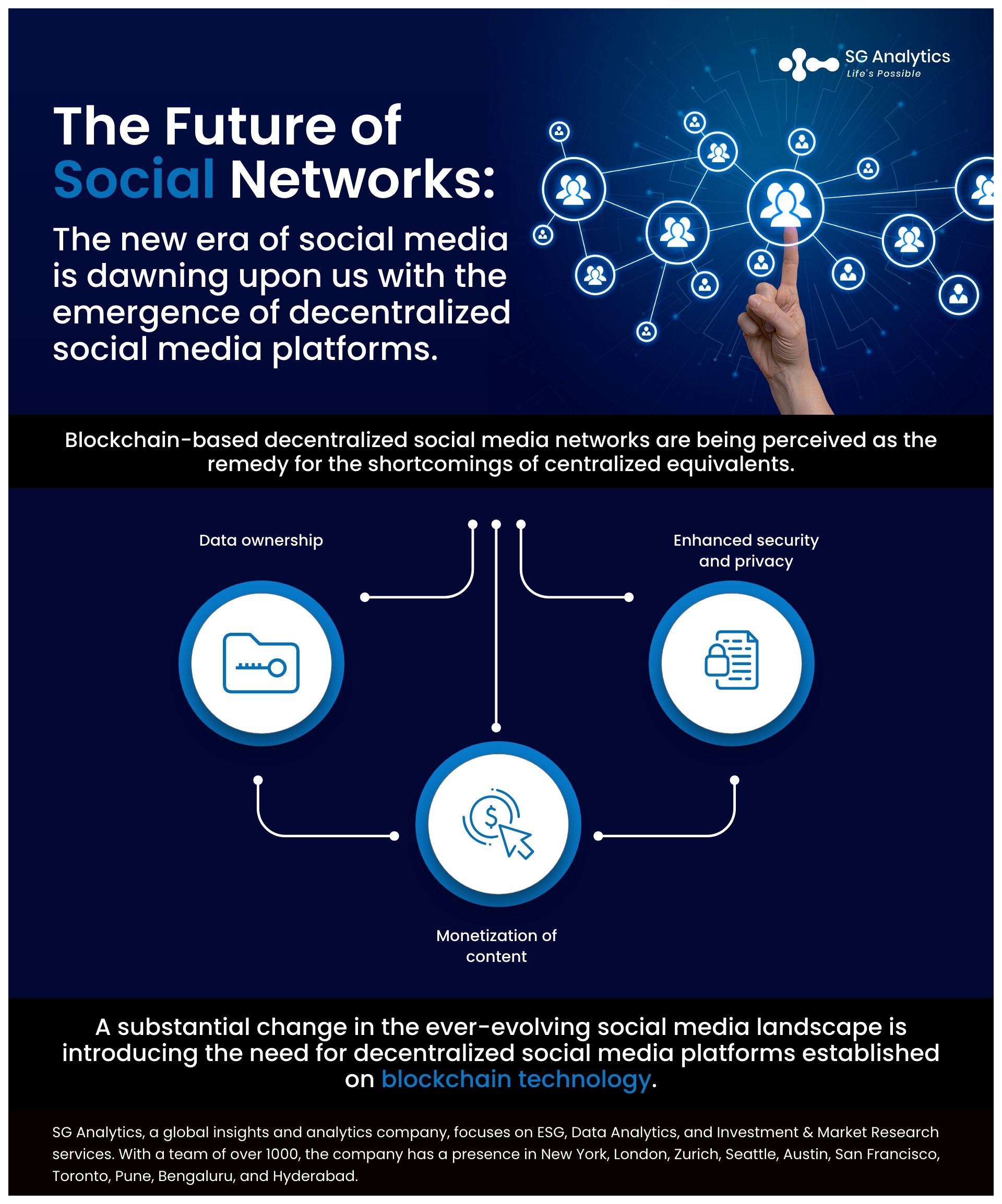In today's fast-paced digital age, social media is revolutionizing the way users connect and communicate to share data. The landscape of social networking has been constantly evolving. However, this new era is dawning upon us with the emergence of decentralized social media platforms that will help reshape the foundation of the way users interact online.
It is vital to understand that the rise of decentralized social media platforms is not just a technological trend but a cultural shift that will put users back in control of their online experiences. They are set to reshape digital engagement, thereby offering individuals ownership, transparency, and new horizons for marketing strategies.
Decentralized marketing platforms embody the principles of transparency and user-centricity. Brands that adapt to this paradigm shift will stay relevant and contribute to creating a more equitable and empowered online ecosystem. This new chapter of digital evolution will present opportunities for both users and brands and restructure the digital landscape for the better.
Read more: Web 3.0 Marketing Trends 2023: Everything You Need to Know
The Growing Potential of Decentralization and Blockchain Technology
Social media has seeped into our lives. The growing concerns about censorship, data ownership, and privacy are now leading to the emergence of decentralized social media platforms. These platforms provide users with control over their data and foster a transparent digital environment. The growing popularity of decentralized social media networks and their revolutionary potential is bringing a new paradigm shift.
Blockchain-based decentralized social media networks are being perceived as the remedy for the shortcomings of centralized equivalents. Decentralized social media is built on a transparent and secure infrastructure provided by blockchain. It is offering people ownership and control over their data by eradicating the need for a single body to manage and control it.

-
Data Ownership
User empowerment, along with data ownership, is a priority in decentralized social media networks. Through blockchain-based systems, the user can maintain control over their data by deciding what information to disclose and with whom. Moving toward a user-centric model offers users greater control over their online identity, thus cultivating a more open and trustworthy connection between users as well as the platforms.
-
Enhanced Security and Privacy
Decentralized social media networks integrate cryptography capabilities to offer improved security and privacy. Data breaches and illegal access are less likely to happen as the user data is encrypted and distributed throughout a network of decentralized nodes. The immutability of blockchain further assures that user material cannot be changed or censored.
-
Monetization of Content
Decentralized social media platforms built on blockchain offer novel ideas to monetize content and reward users. Social media creators can receive direct payment for their works by using cryptocurrency. With these incentive systems, value can be distributed fairly as it helps cut out middlemen and allows content producers to get paid directly by their audience.
Read more: Data-Driven Influencer Marketing Campaign: The New Strategy for Growth
Simplifying Onboarding for Decentralized Social Media Apps
With advanced decentralization and user privacy, businesses are facing mass adoption challenges. And one of the critical challenges is seamless user onboarding. Decentralized ecosystems need complex initiation processes and protocols.
The biggest challenge decentralized social apps face is making the onboarding process as frictionless as possible. As a result, mainstream audiences jump through multiple hoops to get onboarded into a social app. A majority of consumers are likely to drop off at the first step. Concerning content moderation and online censorship, decentralized social media should also solve the user experience and simplicity issues to enable mass adoption and make them relevant in the race versus centralized social media giants. Hence, it is critical to obsess over simplicity to eliminate as much friction as possible between each of these steps.

Social Media and Privacy: A Paradigm Shift
Recent events have raised several questions about online censorship as well as the influence of social media. Elon Musk's comment about Mark Zuckerberg's manipulation of the users through algorithmic control attracted many eyes to data usage's opacity. The hypothetical scenario highlighted how algorithms manipulate user data. This has further intensified the debate on concerns about growing anti-Semitism.
The complex challenges social media companies face in moderating content and retaining a balance between free expression and responsible content management are bringing to light the growing concerns about data privacy on centralized platforms.
Despite the concerns, there is a beacon of hope as decentralization and user empowerment are emerging as the keys to shifting control away from centralized giants and back to the user. To address censorship concerns and privacy issues, decentralized social media protocols present a more equitable and safe future for social media.
To scale decentralized social applications there has been significant attention devoted to scaling decentralized finance applications. This is changing how global social media is designed. The primary objective is to contradict centralization in contemporary social media, as a majority of the power has been wielded by a handful of corporations over public discourse.
Read more: Building Data Trust for Data-Driven Decision-Making Across Organizations
The emergence of groundbreaking fusion between social networks and decentralized platforms has now led to the introduction of innovative solutions along with automated copyright systems and decentralized content markets.
It presents a solution where the user-generated content can reside on a public blockchain, thus eliminating centralized gatekeeper control and empowering users. In this realm of social networking, the reins of control over user data are now being handed back to the users.
Embarking on the Path to Widespread Adoption
Decentralized social media platforms have multiple benefits. However, they still have a long journey to cover before becoming widely used. Some of the difficulties include:
User Experience: To compete with centralized platform interfaces, decentralized platforms need to put user experience as the top priority. Enhancing scalability, speed, and user-friendly interfaces are required to attract mainstream users.
Network impact: For social media websites, the network impact is vital. Decentralized systems need a critical group of users who can engage and interact with one another. With marketing initiatives and strategic alliances, businesses can fasten this process. However, decentralized social media sites should navigate and abide by laws to maintain sustainable growth and avoid potential legal pitfalls.
Awareness: Blockchain technology and the concept of decentralized social media are still foreign to many. Users must be aware of the advantages as well as the potential of decentralized platforms.

Read more: Fostering Diversity in Tech: The New Catalyst for Innovation and Growth
Final Thoughts
A substantial change in the ever-evolving social media landscape is introducing the need for decentralized social media platforms established on blockchain technology. Some of the top priorities on these platforms include data security and ownership, user empowerment, privacy, and freedom of expression.
Decentralized social media platforms are offering transformative solutions to overcome the drawbacks of centralized platforms by harnessing data transparency, security, and decentralized blockchain characteristics. Even though there are still underlying concerns, a more user-centric and inclusive social media experience is possible. The path to overall acceptance of decentralized social media is now becoming clearer as people are becoming aware of its advantages. And with this, the balance of power in the social media landscape is set to shift in favor of the users.
SG Analytics, recognized by the Financial Times as one of APAC's fastest-growing firms, is a prominent insights and analytics company specializing in data-centric research and contextual analytics. Operating globally across the US, UK, Poland, Switzerland, and India, we expertly guide data from inception to transform it into invaluable insights using our knowledge-driven ecosystem, results-focused solutions, and advanced technology platform. Our distinguished clientele, including Fortune 500 giants, attests to our mastery of harnessing data with purpose, merging content and context to overcome business challenges. With our Brand Promise of "Life's Possible," we consistently deliver enduring value, ensuring the utmost client delight.
A leader in the Media & Entertainment space, SG Analytics helps leverage advanced analytics capabilities to make accurate decisions and accelerate business growth. Contact us today if you are in search of media & entertainment solutions that enable businesses to solve problems by harnessing disruptive data, artificial intelligence, machine learning, and cutting-edge technologies.









